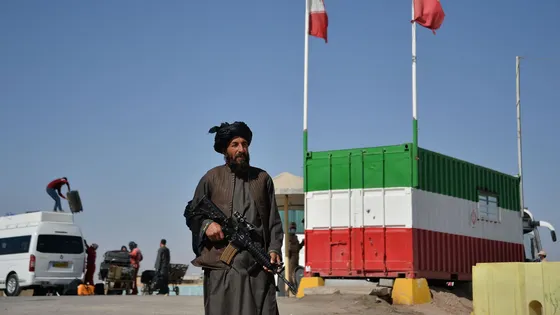Clashes have left several dead between the Iranian army and the Afghan Taliban, and reinforcements are sent on both sides. At stake, the beginning of a river linking the two countries, but this affair awakens an old religious and national hostility.
These are only a few skirmishes so far, which have still resulted in several deaths. But a conflict of greater intensity threatens between Afghanistan and Iran, two neighbors with difficult relations. Each accuses the other, military reinforcements are sent to this border of more than 900 kilometers long: the risk of escalation is great.
As with all conflict, there is an immediate cause, and deeper explanations. The immediate is water. Tehran accuses Kabul of violating an agreement dating back to 1973 governing the flow of the Helmand River, a vital source of water. This river flows more than 1,000 kilometers, and according to Tehran, Afghanistan, upstream, is building new hydroelectric and irrigation dams: changes that affect the flow downstream, in Iran, in a region already suffering from drought .
Afghanistan denies these accusations and puts forward climatic reasons. We find ourselves here with an increasingly frequent problem in the world, water becoming a strategic matter for which we can fight.
But this is not the only explanation, because this region presents an incredible religious and human complexity. Both countries have Islamist regimes, but the Islamic revolution in Iran relies on the country’s Shia majority, while the Taliban, who have regained power in Kabul, are Sunnis, mostly of Pashtun ethnicity.
The religious schism does not explain everything, far from it, but it should not be ignored either. The propaganda videos of the Taliban, which have been increasing their attacks against the Iranian regime for the past few days, also qualify the Shiite leaders as infidels and threaten to go and attack them as far as Tehran. In the past, the Taliban have regularly been accused of preying on other minorities in Afghanistan, and in particular the Hazaras who are predominantly Shia.
To the victory of the Taliban in 2021, Iran reacted with caution, seeking a balance between its defense of Afghan Shiites and the need for stability in its relationship with the new masters of Kabul. This balance seems broken.
The rhetoric of war will not necessarily translate into armed confrontations. Both countries have their internal problems, the Taliban are still not recognized by the international community, and face the difficulty of governing a bloodless country; Iran is subject to sanctions, and still has to deal with the movement initiated by women, which the regime is unable to crush despite fierce repression.
But this border has a history that is fueled by violence.
Aliyeh Ataei, a novelist of Afghan origin but of Iranian nationality, born on this divide between the two countries, has just published “The border of the forgotten” (ed. Gallimard). His poignant story focuses on his family history, between the two countries, on these men and women who flee one war to come across another, eternal renewal. During a debate at the Étonnants Voyageurs festival this weekend, she had these terrible words: “by dint of living in war, the gene of war has entered us”.
Who can believe that it is through arms that the water problem will be solved, or that the entangled peoples will find peace? But nothing and no one has a hold on these two regimes full of religious certainties.
This article is originally published on







